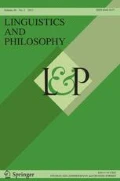Abstract
This paper presents problems for Stalnaker’s common ground theory of presupposition. Stalnaker (Linguist and Philos 25:701–721, 2002) proposes a 2-stage process of utterance interpretation: presupposed content is added to the common ground prior to acceptance/rejection of the utterance as a whole. But this revision makes presupposition difficult to distinguish from assertion. A more fundamental problem is that the common ground theory rests on a faulty theory of assertion—that the essence of assertion is to present the content of an utterance as new information. Many examples are presented of utterances which are felicitous but not informative in this way.
Similar content being viewed by others
References
Abbott B. (2000) Presuppositions as nonassertions. Journal of Pragmatics 32: 1419–1437
Bach K., Harnish R.M. (1979) Linguistic communication and speech acts. MIT Press, Cambridge
Birner B., Ward G. (1994) Uniqueness, familiarity, and the definite article in English. BLS 20: 93–102
Burton-Roberts N. (1989) The limits to debate: A revised theory of semantic presupposition. Cambridge University Press, Cambridge
von Fintel, K. (2006). What is presupposition accommodation, again? Cambridge: MIT. Available at http://pragmatics.osu.edu/.
Gazdar G. (1979a) Pragmatics: Implicature, presupposition, and logical form. Academic Press, New York
Gazdar G. (1979b) A solution to the projection problem. In: Oh C.-K., Dinneen D.A. (eds) Syntax and semantics, volume 11: Presupposition. Academic Press, New York, pp 57–89
Grice, H. P. (1975). Logic and conversation. In P. Cole & J. L. Morgan (Eds.), Syntax and semantics, volume 3: Speech acts (pp. 41–58). New York: Academic Press (Reprinted in H. Paul Grice, 1989, Studies in the way of words (pp. 22–40). Cambridge: Harvard University Press).
Grice, H. P. (1981). Presupposition and conversational implicature. In P. Cole (Ed.), Radical pragmatics (pp. 183–198). New York: Academic Press (Page references are to the reprint in H. Paul Grice, 1989, Studies in the way of words (pp. 269–282). Cambridge: Harvard University Press).
Lewis D. (1979) Scorekeeping in a language game. Journal of Philosophical Logic 8: 339–359
Malinowski B. (1923) The problem of meaning in primitive languages. In: Ogden C. K., Richards I. A. (eds) The meaning of meaning. Routledge & Kegan Paul, London, pp 451–510
Prince E.F. (1978) A comparison of wh-clefts and it-clefts in discourse. Language 54: 883–906
Simons M. (2003) Presupposition and accommodation: Understanding the Stalnakerian picture. Philosophical Studies 112(3): 251–278
Simons, M. (2006). Presupposition without common ground. Pittsburgh: Carnegie Mellon University. Available at http://www.hss.cmu.edu/philosophy/faculty-simons.php.
Simons M. (2007) Observations on embedding verbs, evidentiality, and presupposition. Lingua 117(6): 1034–1056
Soames, S. (1982). How presuppositions are inherited: A solution to the projection problem. Linguistic Inquiry, 13, 483–545 (References are to the reprint in S. Davis (Ed.), 1991, Pragmatics: A reader (pp. 428–470). Oxford: Oxford University Press.)
Soukhanov, A. (eds) (1992) The American heritage dictionary of the English language, 3rd edn. Houghton Mifflin, Boston
Stalnaker R.C. (1973) Presuppositions. Journal of Philosophical Logic 2: 447–457
Stalnaker, R. C. (1974). Pragmatic presuppositions. In M. K. Munitz & P. K. Unger (Eds.), Semantics and philosophy (197–214). New York: New York University Press (References are to the reprint in S. Davis (Ed.), 1991, Pragmatics: A reader (pp. 471–482). Oxford: Oxford University Press.)
Stalnaker R.C. (1978) Assertion. In: Cole P. (eds) Syntax and semantics, volume 9: Pragmatics. Academic Press, New York, pp 315–322
Stalnaker, R. C. (1998). On the representation of context. Journal of Logic, Language, and Information, 7 (Reprinted in R. C. Stalnaker, 1999, Context and content (pp. 96–113). Oxford: Oxford University Press.)
Stalnaker R.C. (2002) Common ground. Linguistics and Philosophy 25: 701–721
Szabó, Z.G. (2006). Comments on Kai von Fintel’s paper [What is presupposition accommodation, again?]. New Haven: Yale University. Available at http://pragmatics.osu.edu/.
Author information
Authors and Affiliations
Corresponding author
Rights and permissions
About this article
Cite this article
Abbott, B. Presuppositions and common ground. Linguist and Philos 31, 523–538 (2008). https://doi.org/10.1007/s10988-008-9048-8
Received:
Accepted:
Published:
Issue Date:
DOI: https://doi.org/10.1007/s10988-008-9048-8




